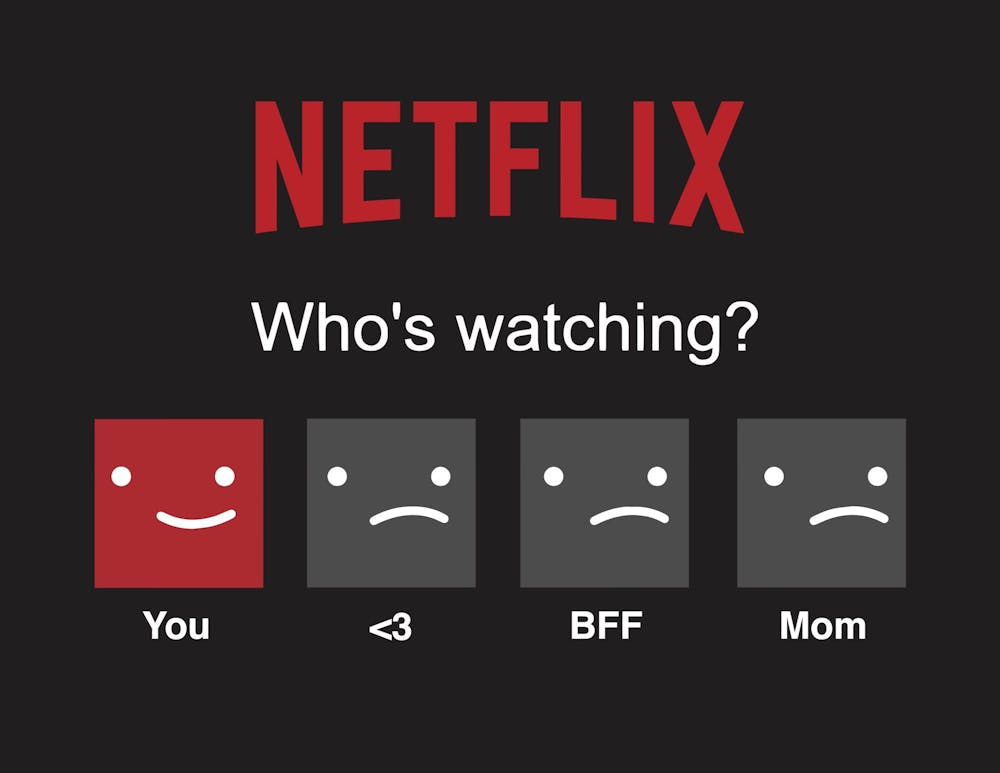It's 9 p.m. on a Monday in April, and I’ve just finished my nightly routine after a long, tiring day of classes, meetings and homework. At this time, I typically would be gearing up to work on assignments into the late hours of the night. But that night, after reading my to-do list, I realized I didn’t have to stay up late.
One free night. One calm moment during the storm of the spring semester.
My mind raced with millions of possible ways to utilize this last hour of the night before I went to bed.
Should I fix my sleep schedule and go to bed early? Should I read another chapter in the book that I’ve neglected for weeks? Maybe I should just go back to my computer and do homework.
My decision? Climbing into bed to watch a comedy special by my favorite comedian, John Mulaney. I scrolled through my TV menu and opened Netflix when an unfamiliar statement appeared on my screen.
“This TV isn’t part of your Netflix household. Create an account to enjoy your own Netflix today.”
What?
I confirmed I was logged into my parent’s account, which we use back home. I clicked “I’m traveling,” since I’ll be in Oxford for the next month and would like to still access Netflix.
The screen changed, asking to send a temporary code to my mom’s phone number, which I quickly canceled; she's definitely asleep and I do not want to disturb her.
There goes my plans for relaxation. But what happened?
A Netflix account is “meant to be shared by people who live together in one household,” the streaming platform proclaims on its Help Center website.
A “household” includes all the devices connected to the same internet address where you mainly watch Netflix. If you want to add a device on a different internet address, or in a different house, to your account, you have to pay an extra $7.99 a month, on top of the at least $6.99 a month you already pay.
Enjoy what you're reading?
Signup for our newsletter
Netflix started cracking down on password sharing in May 2023. However, the anti-password sharing policy didn’t affect me until late April of this year, almost a year after the policy went into effect. Although I didn’t use Netflix much during the school year, I still used it enough to know when the policy was implemented for my account.
What’s weird about all this is that in March 2017, Netflix posted on X, formerly known as Twitter, and said “Love is sharing a password.” The strategy at that time was to get as many people on the platform as possible, no matter the method.
So what made Netflix want to switch up six years later?
Netflix reportedly began to struggle financially when other streaming platforms, like Hulu and Disney+, began to rise in popularity. Between April and July 2022, Netflix lost approximately one million subscribers, and over 100 million households were sharing accounts in 2023. It claimed password sharing was impacting profits and its “ability to invest in great new TV and films.”
I’ll admit I’m not well-versed in finance or business strategies; however, I find it extremely hard to believe that Netflix, with its $33.7 billion annual revenue in 2023 and nearly $9.4 billion revenue from just the first quarter of 2024, is facing financial difficulties.
The crackdown on password sharing is incredibly inconvenient for college students who don’t have the financial stability to pay for monthly subscriptions.
According to a survey conducted by ed-tech provider Cengage, nearly 65% of students pay their educational expenses entirely by themselves. Along with the burden of student loans, students may also have car payments, phone bills, rent and other expenses. Sharing passwords for streaming services takes a load off their financial expenses.
Restricting password sharing prevents students with major financial expenses from accessing entertainment that could be a source of joy and relaxation for them during stressful times.
I also find it extremely outrageous I was kicked out of my parents’ Netflix account. Not a friend’s account or a family member in Arizona’s account, but the account that my mom and dad who live 20 minutes away pay for.
I was not the user Netflix was targeting, and here I am caught in the crossfire.
The password-sharing ban is supposedly benefiting Netflix, as it announced in October 2023 that 9 million new subscribers had been added since the crackdown. However, an increase in new subscribers doesn’t mean an increase in happy subscribers.
I’ll be interested to see if its subscriber numbers drop again when people get fed up and switch over to platforms that don’t ban password-sharing, like Hulu, which is exactly what I did that night in April.
Taylor Powers is a first-year double majoring in journalism and media and communication from Trenton, Ohio. She is a staff writer for The Student and an assistant editor for The Miami Student Magazine.




